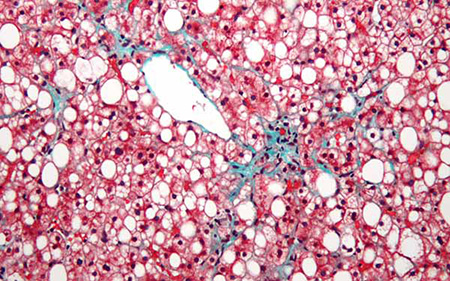New International Initiative Will Focus on Immunology Research and Treatments
Chiba University and UC San Diego launch $2 million collaborative partnership
Published Date
By:
- Scott LaFee
Share This:
Article Content

Histological section of gastric mucosa, the innermost layer of the stomach. Similar mucous membranes, consisting of layers of epithelial cells, line the intestinal tract and various body openings, such as the nose and mouth. A chief function is to stop pathogens and other foreign materials from entering the rest of the body, and thus are an essential part of the immune system. Photo courtesy of Wikimedia Commons
Immunology – and the idea that many diseases can best be addressed by boosting the body’s own immune response – is one of the hottest areas in medical research and clinical treatment. University of California San Diego School of Medicine and Chiba University School of Medicine in Japan have announced a new collaborative research center to investigate the most promising aspects of immunology, especially the area of mucosal immunology, and to speed development of clinical applications.
The Chiba University-UC San Diego Immunology Initiative and associated research center, to be based at UC San Diego School of Medicine, will be established with a $2 million contribution from Chiba University, the funding allocated over five years together with support from UC San Diego.
“This agreement reflects our shared interest in furthering scientific understanding of the human immune system, what happens when things go wrong and how best to remedy them,” said David Brenner, MD, vice chancellor, UC San Diego Health Sciences and dean of the School of Medicine.
“The microbiome has a major impact upon human health, particularly mucosal immune responses that affect virtually every type of disease, from acute and chronic conditions like infection, allergy, asthma, inflammatory bowel disease and arthritis to type 1 diabetes, multiple sclerosis and cancer. Hundreds of millions of people worldwide are affected by immune system dysfunction so the need to find new, effective treatments is incredibly powerful and compelling.”
The effort, which will be co-directed by Peter Ernst, DVM, PhD, professor of pathology at UC San Diego School of Medicine, and Hiroshi Kiyono, DDS, PhD, professor, University of Tokyo and Chiba University, will involve exchanges of faculty, researchers, staff and students. Initial joint projects will focus on medical and veterinary science, vaccine development, allergy, inflammation, infectious diseases, mucosal immunology and the interactions between mucosal immunity and commensal microbiota that promote health.
“This is a collaboration of partners, both with a deep interest in advancing immunology research across disciplines,” said Ernst, who also directs the Center for Veterinary Sciences and Comparative Medicine. “The topics we are grappling with are global in scale. We want to be leaders in both understanding mucosal immunology and in how to use that knowledge to prevent and treat a vast array of diseases such as infectious, allergic and inflammatory diseases. We want to cultivate the next generation of scientists, here, in Japan and around the world.”
Specifically, the agreement outlines creation of multiple affiliated laboratories with principal investigators at Chiba University, UC San Diego and the La Jolla Institute for Allergy and Immunology, which last year formed a multi-year partnership with UC San Diego to boost collaborative basic research of immune system diseases. The Chiba-UC San Diego initiative would also contribute to a new graduate program in immunology.
“Through collaboration and combined resources, we hope to develop new concepts and technologies that ultimately lead to development a preventive vaccine against infectious diseases, allergies and cancers, boosting the body’s ability to block the transmission of agents entering through mucous membranes,” said Takeshi Tokuhisa, MD, PhD, president of Chiba University. “It would be a new approach to next-generation vaccines.”
Share This:
You May Also Like
ALERTCalifornia Awarded 2025 Special Achievement in Geographic Information Systems (GIS) by Esri
Science & EnvironmentStay in the Know
Keep up with all the latest from UC San Diego. Subscribe to the newsletter today.



